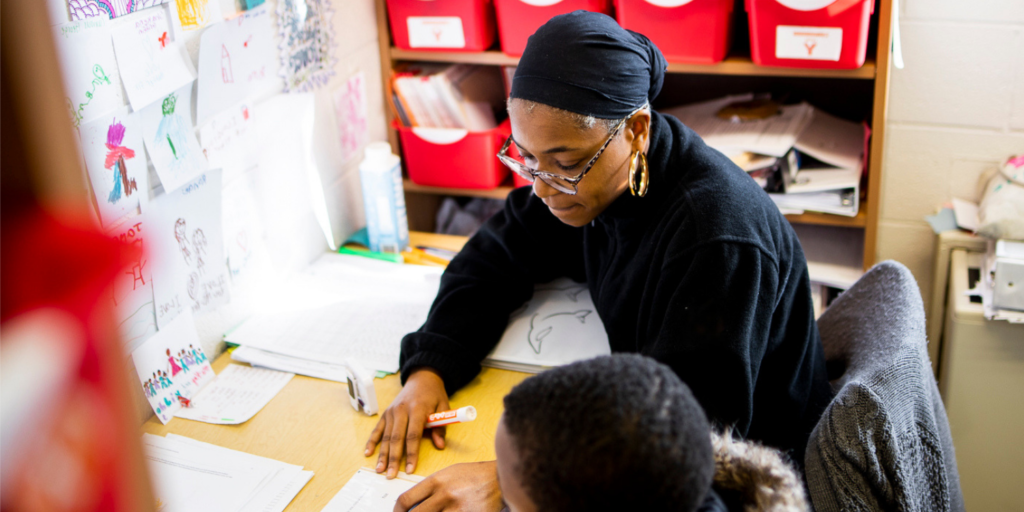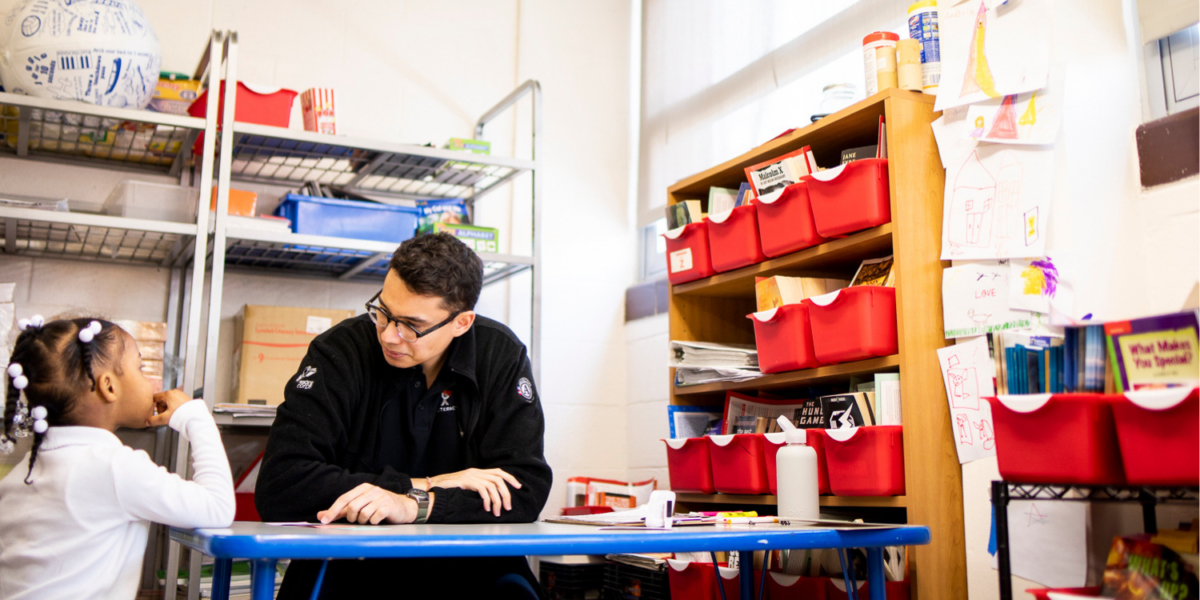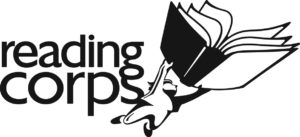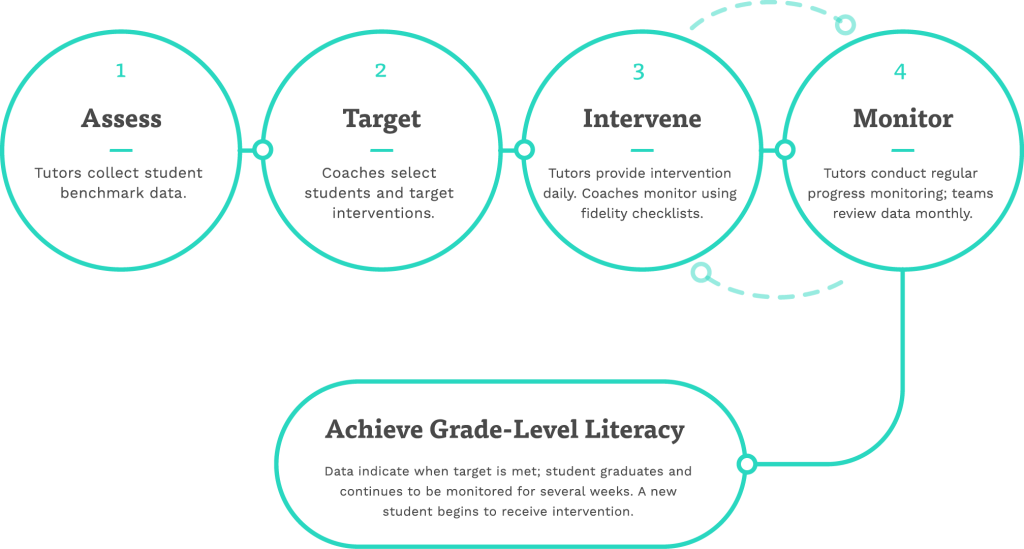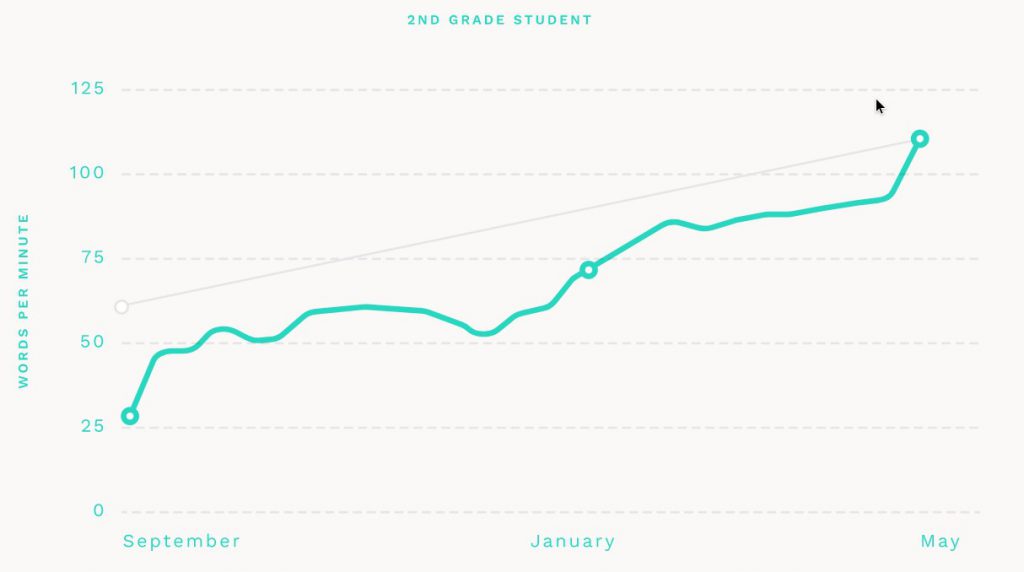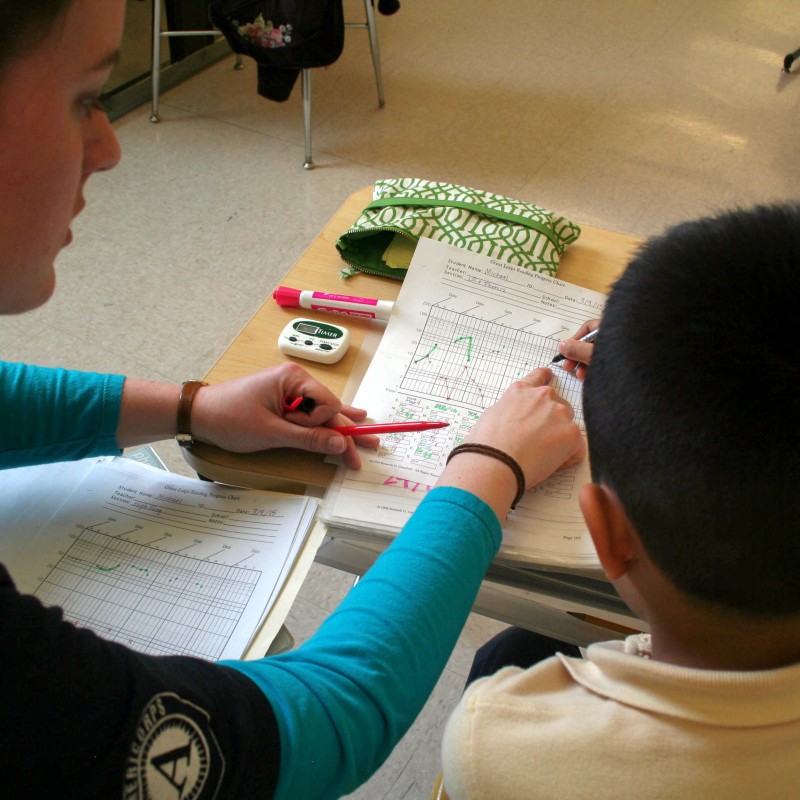The Literacy Lab seeks to close the resource gap for our schools and communities so they can close the achievement gap for children.
The Literacy Lab recognizes that many high-need schools are faced with the challenge of both an achievement gap and a resource gap.
Our approach to this challenge is to provide schools with evidence-based literacy intervention and assessment tools, rigorously trained full-time tutors to implement the model, and a coaching and support structure that ensures the success of the program and students.
We provide our tutors with intensive training, support, and coaching.
Tutors receive approximately 60 hours of training in the Reading Corps model including foundations of literacy, reading interventions, assessments, progress monitoring, data-based decision making, and positive behavior management from The Literacy Lab’s coaching staff. Tutors also receive regular, ongoing coaching at their school site from The Literacy Lab’s Coaching Specialists. The Literacy Lab is a national replication partner of the Reading Corps model.
FIRST SUPPORT LAYER
Internal Coach
A school staff member who supports the school’s tutors day-to-day, guides student selection, and aligns the program with the school’s priorities.
SECOND SUPPORT LAYER
Coaching Specialist
A literacy expert who ensures that tutors implement Reading Corps assessments and interventions with fidelity. Coaching Specialists observe tutors in action, provide real-time feedback, and convene monthly data meetings at each school.
THIRD SUPPORT LAYER
Program Staff
The program staff’s role is to support both coaches and tutors to make sure that the program runs smoothly and that tutors and students are successful.
Literacy Lab tutors benchmark all students three times per year and collect data on a weekly (K-3) or monthly (Pre-K) basis to ensure that students are making the necessary progress toward meeting grade-level targets. Data is shared regularly with teachers and school staff who work in collaboration with Literacy Lab tutors to determine how to best meet the specific needs of each individual child. Below is a sample progress chart for one of our students.
A school principal designates a staff member to serve as “internal coach” for this model. Internal coaches must attend a 3-day Training Institute and subsequent trainings. Internal coaches support program implementation at their school site by: selecting students for intervention, reviewing data & guiding necessary changes, observing tutors to ensure program fidelity, and acting as a liaison between tutors and school community.
The time commitment for internal coaches is about 6-9 hours/month, per tutor. The coaching time commitment is slightly higher at the beginning of the year, during the training and set-up phases of the program.
In Pre-K settings, tutors are embedded into a classroom and support classroom instruction. At certain times, tutors may utilize space outside the classroom to deliver specific interventions or conduct assessments. In K-3 settings, tutors work with students 1:1 in quiet spaces inside or outside of classrooms. Tutoring may take place in a hallway, extra classroom, cafeteria or library. School staff may set up multiple tutoring stations to minimize travel time for students.
In Pre-K settings, tutors collaborate with lead teachers to incorporate embedded and explicit interventions throughout the existing daily schedule. Tutors provide whole group, small group, and 1:1 intervention and support during arrival, morning meeting, choice time, meal time, recess, and dismissal.
In K-3 settings, tutors provide daily, 20-minute interventions to each of the 15-18 students on their caseload. Intervention sessions take place throughout the school day; tutoring should not interrupt core instruction. Click here to see sample daily schedules.
In K-3 settings, the interventions used by The Literacy Lab are designed to provide additional practice that is supplemental to the core reading instructional program provided by the school. The interventions share a common theme focusing on building fluency for basic reading skills such as phonemic awareness, letter sound knowledge, decoding, and oral reading fluency. Tutors are trained to deliver 10 evidence-based reading interventions with selected students.
In Pre-K settings, tutors provide Tier 1 interventions to support core instruction for all students. Tutors provide embedded and explicit literacy, math, and social emotional support to all students throughout the daily routines, including: Arrival, Interactive Writing Activities, Large Group, Choice Time, Meal Time, Small Group, and Transition Songs and Chants. Tutors also provide targeted Tier 2 & 3 interventions to a smaller caseload of students, including: Interactive Read Aloud, Phonological Awareness, Letter Names and Sounds, and Numeracy.
The majority of Literacy Lab tutors are within four years of graduating from college. Selected from a rigorous application process, tutors commit to serving at a partner school for the full academic year.
Tutors cannot be hired away from The Literacy Lab during the academic year. However, many tutors are selected to continue working at their schools after a year of tutoring, especially via programs like The New Teacher Project (Teaching Fellows), Urban Teachers, and KIPP Teaching Residency.
Literacy Lab tutors support students in grades K-3 who are reading below grade level. School staff collaborate with tutors and Literacy Lab coaches to determine each tutor’s caseload. In pre-kindergarten settings, Literacy Lab tutors work with all students in an assigned classroom.
Yes, students receiving other support services are eligible for Literacy Lab programs on a case-by-case basis as determined by school staff.
For students in grades K-3, the Literacy Lab conducts benchmark assessments in the fall, winter, and spring. These are 1-minute assessments from the Formative Assessment System for Teachers (FAST) and include 1) letter naming fluency, 2) letter sound fluency, 3) nonsense word fluency, and 4) oral reading fluency. Progress monitoring assessments are conducted weekly to gauge the effectiveness of interventions.
For students in pre-kindergarten classrooms, the Literacy Lab uses the Preschool Early Literacy Indicators (PELI) and Early Math Inventory (EMI). These brief assessments include 1) alphabet knowledge, 2) vocabulary-oral language, 3) phonological awareness, 4) comprehension, and 5) sound identification.
Common Core places an increased emphasis on comprehension, critical thinking, and analysis. The Literacy Lab’s programs focus on the foundational skills of reading without which it is impossible for students to develop these advanced academic skills.
The Literacy Lab’s programs are curriculum neutral. In pre-kindergarten classrooms, tutors reinforces skills that are already the focus of high-quality early childhood classrooms. In K-3 settings, school staff ensure that tutors are providing additional structured practice for skills already explicitly taught in classroom.
In addition to serving between 15-18 students each day, Literacy Lab tutors become active members in a school community by assisting in school events and volunteering before/after school. Tutors are supported by a school staff member who ensures that the tutors’ activities are aligned with school goals.
Each school is supported by a “Coaching Specialist” – a Literacy Lab staff member and literacy expert – who ensures fidelity to the intervention model in collaboration with the internal coach. Coaches observe tutors for assessment and intervention integrity, monitor data accuracy, and practice data-based decision making to provide the highest quality services to children enrolled in the program.
